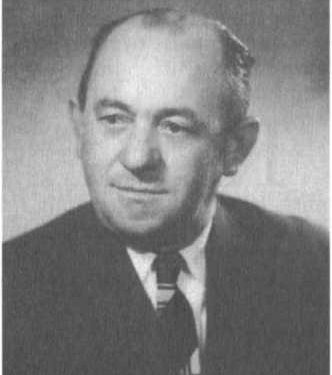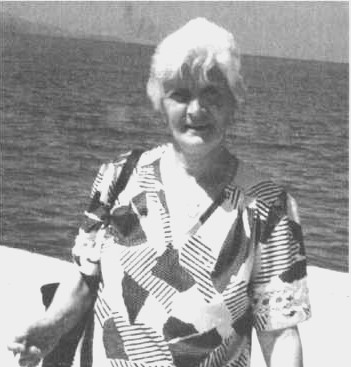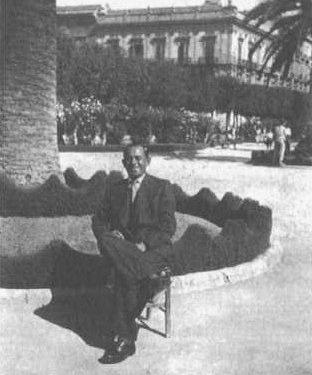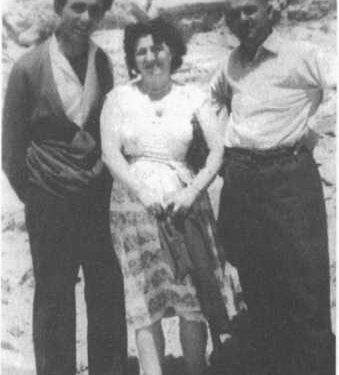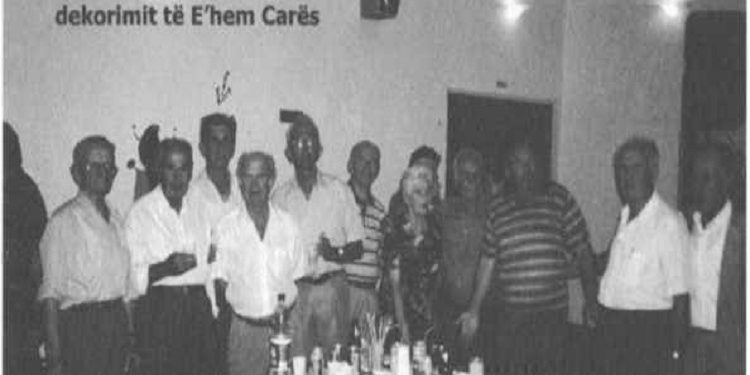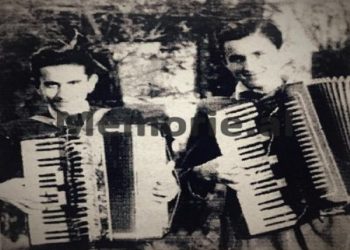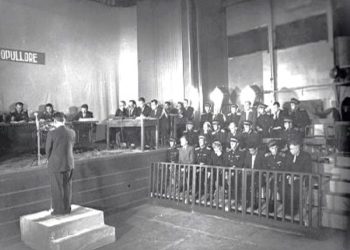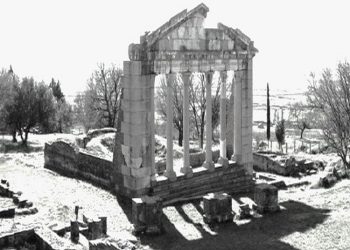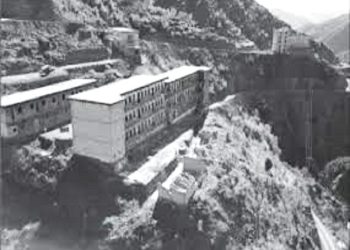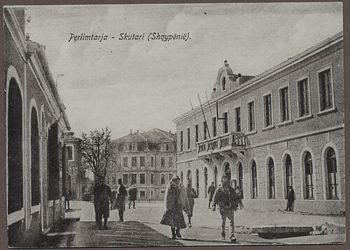From Sofika Prifti Cara
Part four
To Forgive…!
– The old family clan of Kavaja – CARA
Memorie.al/ publishes some excerpts from the book ‘To Forgive’ (Të falësh), authored by Ms. Sofika Prifti (Cara), published by the Institute for the Study of Crimes and Consequences of Communism in Tirana, in which the author has described in detail and with professional competence the history of one of the most prominent family clans, not only in the city of Kavaja but also beyond, the Cara clan, from which emerged not only distinguished patriots who contributed to the national cause and the freedom of Albania, but also well-known intellectuals, graduated in the West, who later returned to the homeland, contributing in several fields of science and life. But even though the scions of the Cara clan dedicated their lives to the national cause, after the communists came to power at the end of 1944, they would be persecuted, imprisoned, and interned, and the fierce class struggle would pursue them until 1990, when the collapse of the communist regime began.
Continued from the previous issue
ISLAM CARA (1883 – 1960)
Islam Cara (Uncle Lami), was born in Kavaja on April 2, 1883, in a simple house, in the “Zguraj” neighborhood of Kavaja. The tradition of the Cara family’s genealogical tree has always been patriotism and a freedom-loving spirit, dedication to the country and birthplace. Uncle Lami was raised and formed with these qualities: a kind, respectable, measured man, with a compassionate heart, and a fervent patriot. But time greatly wounded this good man.
Uncle Lami had participated with a weapon in hand in the war that took place in Shkodra, Plav, and Gucia, in the years 1910-1914, for the defense of Albanian territories from the Serbo-Montenegrin hordes. Later he became the neighborhood elder (kryeplak) in the “Zguraj” neighborhood. Islam Cara was a participant in the group of Kavaja citizens who escorted Ismail Qemali to Vlora. He personally accompanied him to Çermë, but for health reasons, he returned to Kavaja there.
Uncle Lami was married and had two wives: Duda was his first wife, from the Arapaj family in Çermë, with whom he had two children, Musa and Sadete, who was married in Tirana to Shaban Kacëri and had no children. His second wife, Aishja, was from the Dedej clan in Kavaja, with whom he had one son, Rexhep. Below you will have the opportunity to read about Musa’s departure abroad and how he left his wife with four children at home.
With the departure of his son, Musa, the heavy burden of raising his grandsons fell upon Uncle Lami, along with his son’s wife, Naile. In general, the people of Kavaja have had trade in their blood, and it was not for nothing that people respectfully said: “The people of Kavaja extract money from a stone!” Uncle Lami was involved in the trade of clay jars, pitchers, pots, bowls, etc., all these items made of clay. Even in his trade work, he always remained an honest and correct man with everyone.
Uncle Lami passed away in July 1960. With the death of their grandfather, the grandsons lost their dearest person, who, despite his old age, raised them with great effort and sacrifices. The coffin with Uncle Lami’s lifeless body was escorted to its final resting place by many people, who were not only from Fier but also from Kavaja, Durrës, Tirana, and the surrounding villages.
MUSA CARA (1910-1982)
In these lines, I want to dwell on the merchant of Kavaja, Musa Cara, the son of Uncle Lami and Dudije, the father of my husband, born in the “Zguraj” neighborhood on August 2, 1910. He was married to Naile, from the well-known Idrizi clan in Kavaja, and from this marriage, God gave them four sons: Sabri, Bardhi, Xhevdet, and Besnik.
Musa was involved in the food trade, which he expanded and extended to Kavaja, Fier, Vlora, and Tirana. Work went best for him in Fier, where he bought land from the Vrionas family and built a house, and thus brought his family there in 1939. The Italian occupation found him in Fier, and later the German military forces arrived. Albania was occupied by foreigners. All Albanians wanted the liberation of the country, which is why partisan groups were created. From the beginning of the liberation movement, Rexhepi, Musa’s younger brother, inspired by democratic ideals and deceived by the communist propaganda of the time, like many others, embraced the path of the movement, and for these reasons, he was pursued by the Germans, because paid agents and spies denounced him.
The Germans had forcibly occupied their two-story house, which was still unfinished. On the other hand, Musa was pressured because of his brother, Rexhepi. Events unfolded in such a way that the two brothers were separated into two different currents: Musa ended up with the “Balli Kombëtar” (National Front), while Rexhepi became a partisan, for a noble goal, the liberation of the country. A person must be measured to make serious decisions and not rely on imagination or momentary emotions.
You must think long and wisely to justify the goal you have set for yourself to do good. However, something unpleasant happened: the leaders of the partisan groups were not fighting united with the nationalist groups but began to kill them from behind, liquidating them not only as individuals but also in groups. Thus, Mehmet Shehu, with his group in the Lushnja area, brutally killed 72 Ballists and put them in a common grave. One of them, named Kip Xhepa, before they killed him, was told to agree to become a communist, so he would be saved.
But he retorted, with contempt: “I would rather become a pig, but I will never become a communist!” Then Mehmet Shehu’s men put a burning pepper in his mouth and executed him. Similarly, in Gërhot of Gjirokastra, 36 others from Nano Gjoni’s group were executed from behind, where no less than 5 people were from the Gjoni family. In 1944, when the country was liberated, these nationalists and Ballists were persecuted by the Hoxha government, physically liquidating them, imprisoning them, and interning their families far and farther away.
To avoid becoming prey to the persecutions of the Hoxha government, many of these innocent people took the road of escape abroad. One of them was Musa Cara, who had been an exponent of “Balli Kombëtar”; he first left for Italy, and towards the end of 1946, he emigrated to distant Australia. The communist state immediately confiscated all his goods and assets (cars, land, shops), even the still-unfinished house. They only left us an old warehouse to live in. Musa, alone, in exile, feeling the burning longing for his birthplace, deep love for his parents, for his wife, with whom he lived together only 11 years in the family, for the 4 children, whom he left as infants:
Sabri – 9 years old, Bardhi – 6 years old, Xhevat – 4 years old, and Besnik only 2 years old; for his sister Sadete, for his brother Rexhep, for his relatives, and for his homeland. God advises us to forgive! But can this category of discredited and criminal people be forgiven, who stained their filthy hands with innocent blood, or eternally separated people of the same blood while they were alive?! Musa was leaving his relatives in the hands of the communists, who did with them as their black heart desired.
Does God agree to forgive these monsters?! Musa never repented, because he always wanted a truly Western democracy for his country. The communists in post-war Albania, obedient puppies of the Hoxha government, were unscrupulous criminals who killed innocent people without trials. Opposition in a forceful debate is a test for the defenders of an ideal, who do not shy away from confrontation. I am convinced that neither death, nor life, nor angels, nor governments, nor the present, nor the future, nor powers, nor heights, nor depths, nor any other miracle, can change the soul of an evil, criminal person, because the bad remains bad, and the good remains good in life.
Musa Cara had shown his great spirit even before the War, helping the poor as much as he could. During the war, with a generous spirit, he saved many people from death, such as; Rrapi Gjini, Pilo Bandilli, Baki Dervishi, Nikollaq and Virgjini Bega (sister and brother), both partisans, and many others like them. Many people speak of Musa with great respect even in Australia, and the reason was that even there he hosted many Albanians from Albania and Kosovo who went to that distant country for the first time. Musa, this man with a big heart, supported such distressed people with his own expenses until they settled with a house and a job.
Musa owned a two-story villa, a hotel, and a cafe by the sea, in Melbourne, Australia. Coincidentally, some time ago, in Patras, Greece, we met a Kosovar emigrant who had come on vacation from Australia, and he spoke very warmly about our man, Musa Cara. Our acquaintance was completely accidental: Bardhi was fishing by the sea with hooks, as he loved fishing very much, and we occasionally spoke to him: “Well, did you catch it? It escaped you, it ate the bait! Well, good luck!” The Kosovar emigrant heard us speaking Albanian, approached and quickly engaged in conversation with great longing and asked us:
“Where are you from?”
“From Albania! From Kavaja!” – we answered him. Then he confessed to us that when he went to Australia for the first time, a man from Kavaja named Musa Cara had helped him greatly.
“Do you know him?” – he asked us, without knowing that his benefactor was Bardhi’s father. While Bardhi smiled and spoke emotionally:
“You knew my father?!” I am the son of Musa Cara, and we came to Greece to get a visa at the Australian Embassy, which covers Albania in Greece. He happily jumped up and hugged us with love and spoke with deep respect for Musa Cara, how he had appeared to him as a guardian angel and had helped him. Then he put his hand in his pocket, took out a small block, and told us: “Here is my address and phone number. If you come to Australia, my house is open to you, and also my help, just as your father did for me and many others.”
This was a respect that flowed deeply from his heart, a sincere respect, which is distinguished by behavior and not by words. For as long as we stayed there in Greece, we exchanged lunches and dinners together. It felt as if we had met Musa Cara himself, the good man. But the time came when Musa’s heart, badly wounded to the aorta, stopped its ticking prematurely, on January 10, 1982, in Melbourne, Australia, just a few years before the people of his city would rise to kill fear, to overthrow communism as a political system.
He did not get to see with his own eyes his compatriots who turned their backs on the “sun of communism.” Musa closed his eyes forever, but his love always remained unquenched for his country, parents, children, and relatives. He died in exile, forced by that fierce communist system, which did not even allow them to communicate with letters, which were sent but never reached the family. Before he died, Musa Cara had left a will for his four sons for the villa, the hotel, and the cafe by the sea in Melbourne. But this wealth was never taken.
We were told that this property of ours was under the custody of four people: Mustafa Beqiri from Tirana, Athanas Kola from Kavaja, Mehmet Zyka from Peshtan of Fier, and Muhamet Zyka. Once they brought us four checks worth 1550 pounds sterling for the four sons. The two who were interned were told: “Cash them, because you will return from internment, and you will need them at home!” They cashed them at a ridiculous price, but they didn’t bring them home. Only with the advent of the era of democracy, in 1991, did they return to their homes, although the tenants did not want to leave the house. Two of them, Bardhi and Xhevdeti, did not cash them.
They tried to go to Australia, through Greece and Yugoslavia, but could not. Several times we knocked on the door of the Ministry of Foreign Affairs of Albania, and afterward, to help us realize our goal, but no help was given to us. Thus, that inherited property was never taken! The two checks with money had been taken from the Melbourne bank by unknown people! The original checks remained at home, as a bitter memory…!
Once a person of the communist power, (today a lawyer,) told us with cynicism: “Don’t hope in vain, because that property is no longer there, and no one will take you there!” As the years passed, I judge that this man was right. Musa Cara died in exile, very far away, in Australia, taking with him the longing for his homeland, for his parents, for his wife and children, for his sister and brother, but also for all his relatives. His children became men, but they never knew their father. They would very much like to place bouquets and wreaths of flowers on their father’s grave, but…!
REXHEP CARA (1922-2013)
Rexhepi was born in Kavaja, on October 3, 1922, in a simple house, in the “Zguraj” neighborhood. He completed his primary education in Kavaja with very good results. He was a regular, disciplined student, curious and eager to learn everything he saw. Initially, when he was young, he worked in trade with his brother, Musa, but later their paths diverged: he followed the path propagated by the communists, thus joining the National Liberation Movement, initially organized in partisan groups and later in larger formations.
Initially, the young Rexhepi distributed tracts to Fier’s urban families, then he did this work in the villages, speaking passionately to people about the national feeling, the future of the homeland, and freedom. However, when Rexhepi learned that he was being followed by the agents and spies of the occupier, he went to the mountains as a partisan, with the Mallakastra group, which operated in that area. In November 1943, the young Rexhepi came and joined the Peza group. And, with the formation of the XXII Strike Brigade, he became part of this brigade until the end of the War.
By special order from the General Staff of the Partisan Army, the XXII Brigade and several other brigades went to aid the peoples of Yugoslavia to be liberated from the German armies. These Albanian brigades went deep, all the way to Višegrad. There, Rexhepi was wounded several times and underwent surgery to remove the bullets. After returning from Yugoslavia, in 1945, Rexhepi worked for some time in the Ministry of Defense, in Tirana. He was dressed in military uniform until 1951, and for his good work and high conscience, he was honored with certificates of honor and praise, in the service of police order.
Later, at his request, he left the police ranks and Tirana, going to Fier, near his elderly parents. In this city, he started working at the cotton ginning factory as a mechanic, and then went to work at the cotton factory in Rrogozhina. For his good and conscientious work in both factories, Rexhep Cara was honored with certificates of honor, certificates of praise, was placed on the honor board, and was given a Medal of Honor for contributions to production.
After many years of tiring and conscientious work, Rexhepi retired and went to live near his family in Fier. But, as I explained at the beginning of this book, he later had to go to Kavaja, his birthplace and the birthplace of all his ancestors, in the “Zguraj” neighborhood. Rexhepi married Hajrie, from the Mullaliu clan, and they had four children together: Shpëtim, Gjylizane, Mirsije, and Islam, who was named after his grandfather after his death. All four children were raised and educated as kind, respected, correct, and exemplary people everywhere: in the family, at work, in the neighborhood, in society, etc.
Hajrie was a good seamstress, and although she was a young bride, she had to roll up her sleeves, because at home she also found her husband’s four nephews, but she was never upset by them. She sewed and fixed clothes for everyone, they loved her very much, and she loved them sincerely too. When the brother’s sons grew up and the communist system had targeted them, to sacrifice them, by putting them in prisons, etc., that system also separated the uncle from the nephews. But Rexhepi was a very righteous man.
He had given a lot to that party, had been separated because of the class struggle and did not even speak to his nephews, and yet, despite everything, from the beginning of the eighties, they took away his party membership card, which he had held with honor for many years. The communists of the Hoxha government were heartless; they continued the class struggle for seven generations! Rexhep Cara lived long and died at the beginning of 2013, in Kavaja. He was escorted to his final resting place by many citizens of Kavaja, with great respect. Memorie.al




